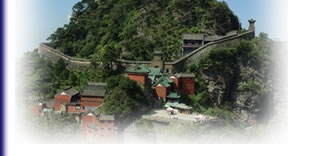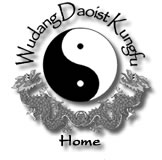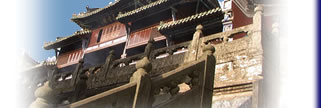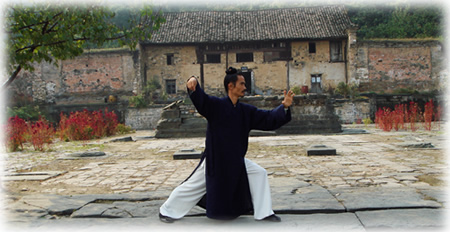 |
||||||||||||||||||||||
 |
 |
 |
||||||||||||||||||||
 |
||||||||||||||||||||||
 |
 |
 -
-*Introduction to the Taiji System*Health Benefits of Practicing Taijiquan*The Practice |
|
Taiji is an internal training method that was created by the great Daoist priest and immortal, Zhang San Feng at Wudang Mountain. Generally when people discuss “Taiji” they are referring to Taijiquan, or the forms practice involved in Taiji. However, in Wudang, Taijiquan is considered a part of the greater 'Taiji System'. The Taiji System is composed of 3 parts: Wuji, Taiji, and Liangyi. Each of these three parts contains their own practices, purposes, and methods of training. Although the Taiji System is separated into three parts, they are all integrated and complementary to the others. Wuji is another name for ‘nei dan’ (Daoist meditation practice). The practice of Wuji (loosely translated as 'ultimate emptiness') is for the cultivation of our three vitalities: Jing (Essence), Qi (Energy), and Shen (spirit). We practice Wuji in order to promote the health of these three vitalities; Wuji is also understood as the road to immortality. In order to become stronger and more robust in our health and our lives, we must strengthen and practice our Jing, Qi, and Shen. For more information about Wuji, please visit the Meditation section of the website. Taiji is the balancing interaction of yin and yang. Under the Taiji System, Taijiquan is the form that we use to cultivate ourselves and learn to develop and understand feeling in our bodies and how to integrate that into movement. In Taijiquan practice we learn to conceal hardness within the softness of movement and learn to use our breathing through the dantian, and our intention and internal awareness to guide our movement. Contrary to the widespread misconception that Taijiquan is simply a callisthenic exercise for the elderly, it is actually a deep internal practice that requires great dedication and a strong determination. Liangyi is the separation of yin and yang. Under the Taiji System, Liangyiquan is for the use of the energy that we have cultivated through our practice. Whereas in Taijiquan we combine the soft and hard, in Liangyiquan practice, we separate the soft and hard. The power of Liangyiquan is explosive, resembling a bomb detonating; its practice is more for use in practical fighting application. While in Taijiquan, all movement is the same speed, with the same balance in softness and hardness at once, Liangyiquan movement is slow and soft, followed by fast explosive movement, called fali. The practice of all of the elements that comprise the Taiji System can help us to more deeply understand our bodies and minds and learn the methods to make them cleaner, clearer, quieter, and healthier. Taiji training teaches us not only to train our muscles, tendons, and bones, but also to train our intention, internal feeling, awareness, and power.
Health Benefits of Practicing Taijiquan The practice of Taijiquan holds great benefits for those looking to improve their physical, mental, and emotional health. Many people in modern society suffer from chronic neck, shoulder, back, hip and knee discomfort as a result of poor posture and bad living habits. If these strains are not rectified early, over time they can become chronic problems that have a great effect on one’s personal life and overall health; painful problems that become increasingly more difficult to fix as we become older and our bodies become stiffer. Taijiquan places great importance on the cultivation of correct posture. By aligning the posture, maintaining a straight spine and relaxed back and waist, over time practitioners of Taijiquan begin to feel a greater release of built up tension and stiffness in the neck, shoulders, back, waist, and hips. This happens as a result of the process of relaxing the muscles and tendons of the body, especially those that are in the neck, shoulders, and back. The importance of correct bodily alignment and its effect on bodily health also extends to the rest of the body including the arms, hips, knees, and ankles. Being load bearing joints that receive much of the wear and tear of our daily living, the hips, knees, and ankles are often places where tension builds up and stiffness occurs. Incorrect bodily alignment can also have a strong effect on the lower body’s joints – especially the hips and knees. By loosening the muscles in the lower back, tension that is built up around the hips begins to lessen. The practice of the Taiji form greatly improves the strength of the knees and ankles as it gives the body an exercise which focuses greatly on the slow improvement of tendon and ligament health. As the practice of Taijiquan is also helpful in promoting all of the different circulatory systems in the body, greater lubrication of the joints is also a natural result. Promoting greater joint mobility, ease of movement, and flexibility of tendons and muscles can also help to alleviate and prevent the aches and pains the body begins to suffer over time. By releasing built up tension and stiffness in the different areas of the body, all of the circulatory systems begin to flow smoother as blockages are removed and tenseness is alleviated. The results of greater circulation being better immunity, improved blood flow, healthier and more balanced internal organs, a greater ability to eliminate toxins from the body, softer joints, etc. The practice of Taijiquan requires both focus and memory. Correct movement and a relaxed posture require determination and focus which can be built up over time as one’s practice progresses. As some Taiji forms are upwards of 20 minutes long, improving one’s strength of memory is also important. Most students begin with learning a shorter Taiji form before moving on to longer forms, but soon realize that the once daunting task of learning and remembering the longer forms is actually quite easy. Taiji practice necessitates and promotes a relaxed and focused mind and emotional state. Those students who suffer from stress and/or emotional imbalance will find that in practicing Taiji over time their emotions become more balanced and their overall temperament becomes more peaceful as a result of the practice. This comes about through stronger and more balanced organs (which have great influence over the health and balance of the emotions), strengthened circulation, and focusing on regulating deep dan tian breathing and fluidity in slow movement – all changes that come about naturally through practice. The human mind is like a lake. When one looks into the calm waters of a lake they can see to great depths. What is reflected on the surface is clear. When the waters are not calm, seeing through to the bottom is impossible and one’s reflection becomes difficult to discern. With a quieter mind like still waters one can reflect more clearly and understand life more deeply; entering deeper into the mysteries of internal practice and cultivating bountiful jing, qi, and shen in the body. Through the practice of the Taiji System one can truly enjoy radiant health in all of its manifestations. |
Wudang Taoist Traditional Kung Fu Academy |
|
| Website: http://www.wudanggongfu.com | E-Mail: wudang.wushu.info@gmail.com |
| Mobile: (0086)135-978-86695 | Address: Wudangshan, Shiyan City, Hubei Province, China 442714 |